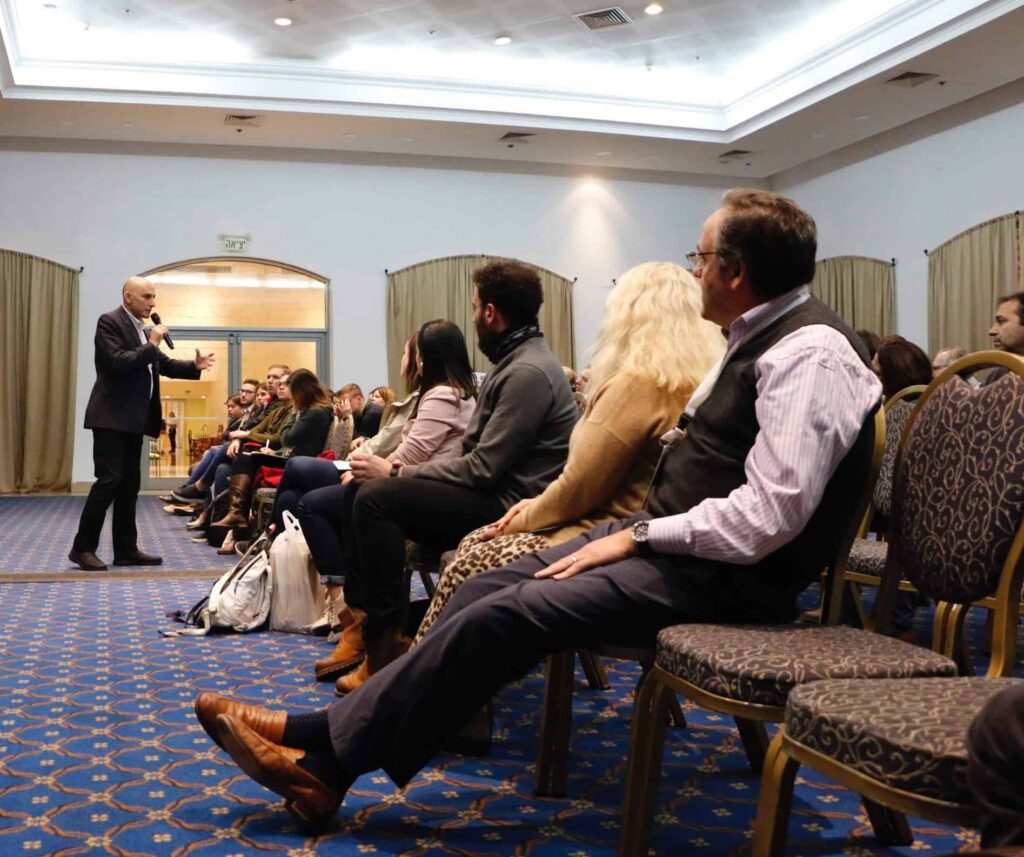Puede que hayas oído hablar de los TED Talks, pero no de los HLD Talks.
En esta edición de Holy Land Dialogues (HLD), a petición popular, los participantes pudieron oír hablar de Tierra Santa a aquellos que la conocen mejor: empresarios, periodistas, activistas y académicos que viven aquí. Estas sesiones tuvieron lugar después de la cena en el hotel, después de pasar el día visitando lugares.
Saxum Foundation reunió ponentes de distintos entornos y religiones para proporcionar una visión más completa de la compleja realidad de esta región.
“Los árabes cristianos han estado aquí desde el principio, desde el primer discurso de san Pedro”.
Imad Younis
La primera HLD Talk estuvo a cargo de Imad Younis, que se presentó como árabe-israelí, cristiano, palestino y presidente de Alpha Omega, una empresa de ingeniería de alta tecnología en Nazaret. Imad desmontó la percepción errónea, pero común, de que los árabes en Tierra Santa son todos musulmanes y habló de cómo ha contribuído al éxito de su empresa el tener trabajadores de todos los entornos y religiones.
 “Los árabes cristianos han estado aquí desde el principio, desde el primer discurso de san Pedro. Debido a la cobertura mediática, mucha gente piensa que ‘árabe’ es sinónimo de ‘musulmán’, pero no es así”.
“Los árabes cristianos han estado aquí desde el principio, desde el primer discurso de san Pedro. Debido a la cobertura mediática, mucha gente piensa que ‘árabe’ es sinónimo de ‘musulmán’, pero no es así”.
“No importa cuáles sean sus opiniones, a la gente le gusta el trabajo que está bien hecho. [En Alpha Omega] tenemos un equipo muy diverso [de árabes y judíos] que comparten la misma misión y visión trabajando juntos… ¿Qué es innovación? Personas que piensan diferente y llegan a una solución. Nuestra compañía ha recibido reconocimiento de la derecha, de la izquierda y del centro político porque nuestra diversidad de empleados, trabajando juntos, consiguen muy buenos productos”.
La noche siguiente, los participantes de HLD escucharon al activista israelí Gadi Gvaryahu, fundador de la ONG Tag Meir que lucha contra el racismo en el país. “Cualquier solución política en el futuro debe ayudarnos a respetarnos unos a otros y a saber al menos algo de la historia y de la cultura de los otros”, dijo Gvaryahu. “En otras palabras, tenemos que aprender a VIVIR juntos”.
“Soy unos de los que piensa que la religión o construirá o destruirá el mundo. Mucho depende de nosotros”.
José Levy
La tercera sesión de HLD Talks tuvo como protagonista a José Levy, el corresponsal de CNN en Español en Oriente Medio. Habló de la necesidad de objetividad en el periodismo, la diferencia entre los países musulmanes sunitas y los chiítas, el histórico encuentro del Papa Juan Pablo II con Fidel Castro en el que estuvo presente y otros temas interesantes. “Soy unos de los que piensa que la religión o construirá o destruirá el mundo”, dijo Levy, “mucho depende de nosotros”.
“Después de cubrir tantos conflictos, ¿qué crees que es lo que más nos une a los humanos?”. A esta pregunta, Levy respondió que todos deseamos paz y que nuestros hijos vivan en un mundo mejor. Por esta razón él está involucrado en Scholas Occurrentes, una iniciativa que busca un compromiso de educación global junto con el Papa Francisco y el periodista israelí Henrique Cymerman.
El cuarto y quinto ponente fueron, respectivamente, Henri Gourinard y Don Joaquín Paniello, del Instituto Polis de Jerusalén. Gourinard habló sobre la historia del Camino de Emaús, que empieza en Saxum y termina en Emaús-Nicópolis, y que él mismo ha ayudado a investigar. “Mi sueño”, dijo Gourinard, “es que, al final de su viaje por Tierra Santa, los peregrinos puedan andar la ruta hasta Emaús, darse una ducha e irse al aeropuerto”. (Emaús está situado entre Jerusalén y el aeropuerto de Tel Aviv). Los amantes del senderismo y la bicicleta de montaña presentes estaban muy interesados en esta y otras rutas como una forma diferente de explorar Tierra Santa.
Don Joaquín Paniello explicó algunas conexiones menos obvias entre el Antiguo y el Nuevo Testamento, y sobre el Instituto Polis de Jerusalén, en el que estudian y trabajan personas de distintas razas y religiones, del que es capellán.
La última noche, Yisca Harani, una reconocida experta en cristianismo israelí, recordó a los presentes la visión tan distinta que tienen judíos y cristianos de la historia. Los judíos son reconocidos como el pueblo de la memoria y recordó Harani que esa memoria suele ir asociada a un trauma por lo sufrido a lo largo de la historia. Por eso, una misma época o hecho histórico tiene connotaciones muy diferentes en la memoria colectiva de los judíos que en la del resto de naciones.
En definitiva, los participantes estuvieron muy contentos de poder escuchar y preguntar a expertos de diferentes campos que compartieron con ellos una perspectiva distinta de la vida en esta región.
